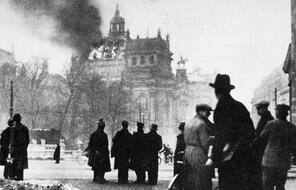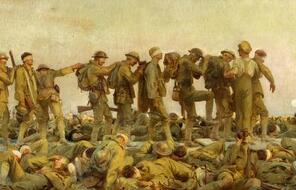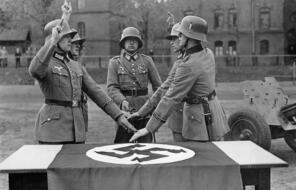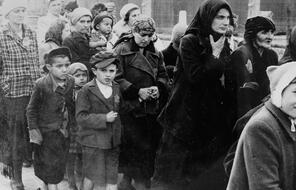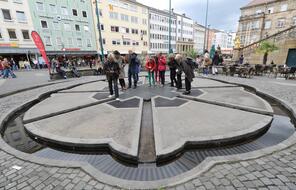A Report on the Murder of Jews
At a Glance
Language
English — USSubject
- History
- The Holocaust
On January 13, 1944, US Secretary of the Treasury Henry Morgenthau, a close friend and advisor of President Franklin Roosevelt and one of the top Jewish officials in the administration, received a memo prepared by a Treasury Department lawyer, Josiah DuBois, and signed by his superior, Randolph Paul, that discussed the murder of the Jews in Europe. That memo stated, in part:
This [United States] Government has for a long time maintained that its policy is to work out programs to save those Jews of Europe who could be saved. I am convinced on the basis of the information which is available to me that certain officials in our State Department, which is charged with carrying out this policy, have been guilty not only of gross procrastination and willful failure to act, but even of willful attempts to prevent action from being taken to rescue Jews from Hitler. . . .
Unless remedial steps of a drastic nature are taken, and taken immediately, I am certain that no effective action will be taken by this Government to prevent the complete extermination of the Jews in German-controlled Europe, and that this Government will have to share for all time responsibility for this extermination. 1
The full memo described actions by the State Department both before and during the war that had routinely kept Jewish refugees from entering the United States by demanding documents that were unobtainable in wartime and blocking any effort to “cut red tape” to allow more refugees into the nation (see reading, World Responses to Kristallnacht in Chapter 7). The State Department had also discouraged religious and human rights groups that needed government support for their efforts to aid and rescue Jews.
Morgenthau condensed the report and sent it to Roosevelt. Then he brought a specific plan to the president at a private Sunday-morning meeting: he wanted the United States to actively pursue rescue. He did not have to remind the president that 1944 was an election year and the behavior of the State Department might be seen by voters as scandalous. A few days later, the president set up the War Refugee Board, under Morgenthau’s supervision. The War Refugee Board provided crucial support and coordination to Jewish organizations, diplomats, and resistance groups across Europe that were trying to rescue Jews and help those in concentration camps. In all, it saved about 200,000 Jews from annihilation. 2 John Pehle, Jr., the man who headed the board, later said that “what we did was little enough. It was late. Little and late, I would say.” 3
Another action considered by the United States and the Allies in 1944 in response to the murder of Jews was to bomb the railroads leading to Auschwitz in order to interrupt the transport of Jews to that death camp. Jewish organizations in America urged President Roosevelt to order the bombing. The military and some civilian leaders, however, strongly advised against doing so, arguing that it would divert resources needed to fight the Nazis, and that defeating Germany in the war as quickly and decisively as possible was still the best course of action. In the end, the United States and the Allies decided against bombing the railroad lines.
Connection Questions
- What factors played a role in convincing President Roosevelt to establish the War Refugee Board? What difference did the War Refugee Board make?
- The memo by Josiah DuBois and Randolph Paul stated, “Unless remedial steps of a drastic nature are taken, and taken immediately . . . this Government will have to share for all time responsibility for this extermination.” Do you agree with this statement? Would the US government, after learning about the mass murders committed by the Nazis, have become complicit in the Nazis’ crimes if it failed to act? Do you think the United States did enough?
- How do you evaluate the American government’s decision not to bomb the railroad lines to Auschwitz?
- What could or should a government do when it receives information about mass murder in another country? What limits, obstacles, or other existing concerns might keep a nation from acting?
- 1Quoted in Richard Breitman and Alan Kraut, American Refugee Policy and European Jewry, 1933–1945 (Bloomington: Indiana University Press, 1987), 189.
- 2 “The War Refugee Board,” United States Holocaust Memorial Museum, last modified January 2016, accessed May 20, 2016.
- 3“War Refugee Board (WRB),” Encyclopædia Britannica, accessed May 20, 2016.
How to Cite This Reading
Facing History & Ourselves, "A Report on the Murder of Jews," last updated August 2, 2016.
This reading contains text not authored by Facing History & Ourselves. See footnotes for source information.


